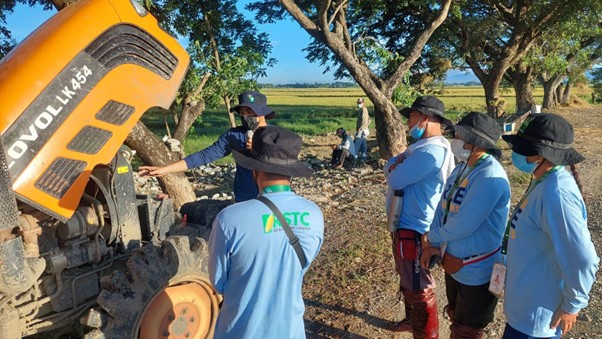
Farm machinery introduced in an ongoing training program under the Rice Competitiveness Enhancement Fund were perceived gender-neutral by the women participants.
“The machines are comfortable and easy to use. A lot of female farmers I know also want to have their own rice machinery because it makes farming easier,” Lorica Avila of Mamburao, Occidental Mindoro, said in a hands-on activity on Oct. 5 in Science City of Muñoz, Nueva Ecija.
Together with their fellow 16 co-trainees, female participants tried the four-wheel tractor, riding-type mechanical transplanter, and rice combine harvester, and were also taught the proper operation and maintenance.
The four-wheel tractor is a multipurpose machine that can pull, propel, or carry equipment in the field. It can be attached with implements like the rotovator that can plow and level the land.
The riding-type mechanical transplanter is used to transplant rice seedlings into a puddled and levelled field with optimum plant spacing and number of seedlings per hill. It can plant 2ha of land per day compared with manual transplanting, which minimizes drudgery and ensures higher crop productivity.
Meanwhile, the rice combine harvester is a 4-in-1 machine that can harvest, thresh, clean, and bag rice in a single pass.
Pilot-tests show that these machines cover more hectares in a lesser amount of time, reduce the labor cost in planting and harvesting, and prevent injuries.
“I had hesitations at first to try the machines, but I was motivated by the thought that skill sets in properly using these machines are needed by farmers, whom I’m going to teach after the training,” Avila said.
The trainees will become full-fledged rice specialists on Oct. 14 after completing a three-month training on the production of high-quality inbred rice and seeds and farm mechanization.
The RCEF Rice Extension Services Program is funded under the Republic Act 11203 or Rice Tariffication Law (RTL), which aims to be competitive amidst trade liberalization. RTL allocates a P10 billion fund every year to provide farmers with free certified inbred seeds, farm machinery, and training. Rice farmers also receive loan assistance from the program.




